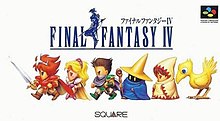
Back فاينل فانتسي 4 Arabic فينال فانتاسى ايڤ ARZ Final Fantasy IV German Final Fantasy IV Greek Final Fantasy IV Spanish Final Fantasy IV Estonian فاینال فانتزی ۴ Persian Final Fantasy IV Finnish Final Fantasy IV French Final Fantasy II HAW
| Final Fantasy IV | |
|---|---|
 Box art of the original Super Famicom (Japanese) release | |
| Developer(s) | Square |
| Publisher(s) | Square
|
| Director(s) | Hironobu Sakaguchi |
| Producer(s) | Masafumi Miyamoto |
| Designer(s) | Takashi Tokita |
| Programmer(s) | Ken Narita |
| Artist(s) | Yoshitaka Amano |
| Writer(s) |
|
| Composer(s) | Nobuo Uematsu |
| Series | Final Fantasy |
| Platform(s) | |
| Release | July 19, 1991
|
| Genre(s) | Role-playing |
| Mode(s) | Single-player, multiplayer |
Final Fantasy IV,[a] titled Final Fantasy II in its initial North American release, is a 1991 role-playing video game developed and published by Square (now Square Enix) for the Super Nintendo Entertainment System. The fourth main installment of the Final Fantasy series, the game's story follows Cecil, a dark knight, as he tries to prevent the sorcerer Golbez from seizing powerful crystals and destroying the world. He is joined on this quest by a frequently changing group of allies. Final Fantasy IV introduced innovations that became staples of the Final Fantasy series and role-playing games in general. Its "Active Time Battle" system was used in five subsequent Final Fantasy games, and unlike prior games in the series, IV gave each character their own unchangeable character class — although at a few points in the story, a dark knight will choose the path of a paladin, or a summoner will evolve to a new tier of spellcasting.
Final Fantasy IV has been ported to several other platforms with varying differences. A remake, also called Final Fantasy IV, with 3D graphics was released for the Nintendo DS in 2007 and 2008. The game was re-titled Final Fantasy II during its initial release outside Japan as the original II and III had not been released outside Japan at the time. All later localizations of Final Fantasy IV, which began to appear after Final Fantasy VII (released worldwide under that title), used the original title.
The various incarnations of the game have sold more than four million copies worldwide. A sequel, Final Fantasy IV: The After Years, was released for Japanese mobile phones in 2008, and worldwide via the Wii Shop Channel on June 1, 2009. In 2011, both Final Fantasy IV and The After Years were released for the PlayStation Portable as part of the compilation Final Fantasy IV: The Complete Collection, which also included a new game, set between the two; Final Fantasy IV: Interlude. Ports of the Nintendo DS remake were released for iOS in 2012, for Android in 2013 and for Windows in 2014. Another enhanced port of FFIV was released as part of the Final Fantasy Pixel Remaster compilation series for iOS, Android and Windows in 2021, for Nintendo Switch and PlayStation 4 in 2023, and for Xbox Series X/S in 2024.
Retrospectively, Final Fantasy IV is often regarded as one of the greatest video games of all time, noting that it pioneered many now common console role-playing game features, including the concept of dramatic storytelling in an RPG.[3][4] It has been included in various lists of the best games of all time, by IGN (at #9 in 2003) as the highest-ranking RPG,[5][6] as well as Famitsu in 2006 reader poll among the best games ever made.[7] It also appeared in various rankings for Best Games of All Time for Electronic Gaming Monthly in 2001[8] and 2006,[9] Game Informer in 2001[10] and 2009,[11] GameSpot in 2005,[12] and GameFAQs in 2005,[13] 2009[14] and 2014.[15]
- ^ I. G. N. Staff (June 27, 2001). "Final Fantasy Chronicles Coming... Tomorrow?". IGN. Archived from the original on November 25, 2023. Retrieved November 25, 2023.
- ^ Cite error: The named reference
famitsusakaguchiwas invoked but never defined (see the help page). - ^ Cite error: The named reference
gamespotwas invoked but never defined (see the help page). - ^ Cite error: The named reference
Turnerwas invoked but never defined (see the help page). - ^ Cite error: The named reference
:0was invoked but never defined (see the help page). - ^ Cite error: The named reference
IGN2003was invoked but never defined (see the help page). - ^ Cite error: The named reference
:1was invoked but never defined (see the help page). - ^ Cite error: The named reference
EGM2001was invoked but never defined (see the help page). - ^ Cite error: The named reference
EGM2006was invoked but never defined (see the help page). - ^ Cite error: The named reference
GI2001was invoked but never defined (see the help page). - ^ Cite error: The named reference
GI2009was invoked but never defined (see the help page). - ^ Cite error: The named reference
GameSpot2006was invoked but never defined (see the help page). - ^ Cite error: The named reference
GF2005was invoked but never defined (see the help page). - ^ Cite error: The named reference
GF2009was invoked but never defined (see the help page). - ^ Cite error: The named reference
GF2014was invoked but never defined (see the help page).
Cite error: There are <ref group=lower-alpha> tags or {{efn}} templates on this page, but the references will not show without a {{reflist|group=lower-alpha}} template or {{notelist}} template (see the help page).